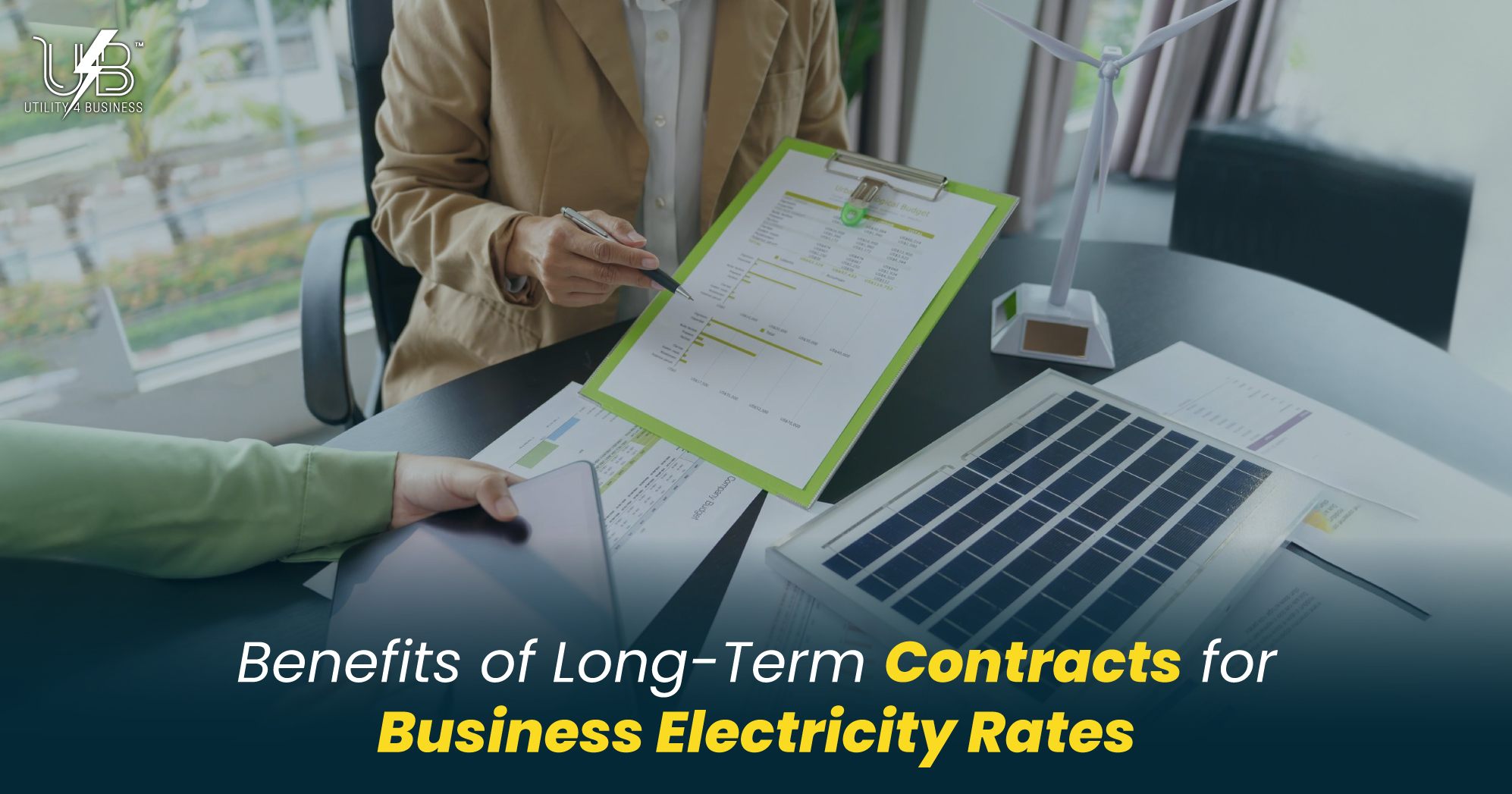Benefits of Long-Term Contracts for Business Electricity Rates
Cut Business Costs: Long-Term Energy Contract Guide

Ever felt your monthly energy bills bounce up and down like a roller coaster? Rising prices can hit your bottom line hard. As a business, you need clear costs you can plan for. That’s where a long-term deal comes in. With a contract that lasts 12 to 60 months, you lock in a steady rate. You dodge surprise spikes and keep your finance team happy.
Understanding Long-Term Electricity Contracts
A long-term electricity contract runs from one year up to five years. It fixes your rate for that full period. You won’t see your unit price change month to month.
Fixed-rate plans give you certainty. Variable-rate plans can leave you open to sudden hikes. In a shifting market, driven by supply issues, global politics, or seasonal demand, fixed rates act like a shield.
Businesses use far more power than homes. You need predictable bills so you can budget accurately. No more guessing whether next quarter’s energy bill will spike.
Long deals match your financial calendar. They let you forecast costs with confidence. That makes board reporting and strategic planning much easier.
Key Benefits of Long-Term Contracts
Rate Stability and Protection from Price Hikes
Locking in a fixed rate stops market swings from landing on your desk. When everyone cranks up the air-con in summer, prices can soar. With a long-term deal, you stay at your agreed rate. For example, a manufacturer avoided a 25% hike during a heatwave simply by signing up for a three-year contract. That saved them thousands and kept production costs steady.
Predictable Budgeting and Financial Forecasting
Fixed monthly bills make your expenses simple to schedule. You know exactly how much you’ll pay for electricity each month. Finance teams can build accurate forecasts for the year ahead. Energy-intensive operations—like warehouses or data centres—benefit most. They lock in costs and free staff from constant rate reviews.
Potential Cost Savings and Incentives
Suppliers often reward longer commitments with lower rates. You might see waived admin fees or introductory discounts. If you sign when market prices dip, you lock in that low rate for years. Compare that to short-term deals, where you renew every few months and risk higher rates. Over time, the savings really add up.
Strategic and Operational Advantages
Reduced Administrative Burden
Long-term contracts remove the constant cycle of comparing offers and negotiating rates. Instead of your team spending hours each quarter on energy procurement, you lock in a rate once and let it run.
That “set it and forget it” approach means fewer emails, fewer phone calls, and no surprise deadlines. Your energy manager can shift focus to value-added tasks—like analysing usage data for efficiency gains or planning expansion projects—rather than getting bogged down in supplier paperwork.
Support for Sustainability Goals
Looking to strengthen your green credentials? Many long-term plans include renewable energy options or green tariffs. By choosing a multi-year contract with a clean-power component, you guarantee a steady mix of wind, solar, or hydroelectric supply.
You can then showcase real, measurable progress to investors, customers, and staff. Long-term green deals also help you meet or exceed carbon-reduction targets, making environmental reporting simpler and more robust.
Enhanced Supplier Relationships
Committing to a longer deal fosters a closer partnership with your energy provider. Over time, you move from being “just another account” to a trusted client.
That trust can translate into perks such as priority technical support, bespoke billing arrangements, or even in-depth energy audits carried out on your site.
When market conditions get tricky, your supplier is more likely to advocate on your behalf or offer tailored solutions because they value your long-term business.
Risk Management
A fixed-rate contract acts like an insurance policy against sudden market or regulatory changes. If new government levies arrive or wholesale costs spike, your rate stays locked. You also gain the ability to match contract length with your corporate plans—whether you’re opening a warehouse next year or relocating offices in two years’ time.
This alignment avoids the headache of mismatched end dates and contract renewals at inopportune moments, keeping your operations running smoothly.
Considerations Before Signing Long-Term Contracts
Long-term deals aren’t risk-free. Exiting early can trigger hefty fees. You might miss out if market rates fall below your locked-in rate. Always read the fine print on usage bands and exit terms. Check for hidden charges before you commit.
Map out your projected energy use over the contract term. Consider working with an energy broker—or use a trusted tool like Utility4Business—to secure the best terms. Finally, review the Electricity Facts Label (EFL) so you know exactly what you’re buying.
Conclusion
Long-term contracts deliver price stability, clear budgeting, and real savings. They reduce admin work and support your green targets. You build stronger supplier partnerships and lower risk exposure. By choosing the right deal length, you turn uncertainty into an advantage.
Ready to simplify your energy costs? Head to Utility4Business and use our business electricity comparison tool. Or try our business energy comparison dashboard to lock in a great fixed rate. Book a free consultation today and see why so many UK businesses trust Utility4Business for their comparison of business electricity rates needs. Take control of your power bills now!
Find This Article Helpful? Share It Now!
At Utility4Business, we offer top-notch customer support and business utility solutions for businesses across the UK. Consider sharing this article and helping others discover how our expertise can add value to their business success.

Read Our Latest Posts
Explore our latest blog posts and learn how Utility4Business can support your business growth with tailored utility solutions and services. Stay ahead of the curve with the latest information from industry experts and take advantage of our user-friendly comparison services to find the best business deals.


Get Connected
At Utility4Business, our team of experts can help you figure out the highest-value business utility deals that will help your business grow over time.


